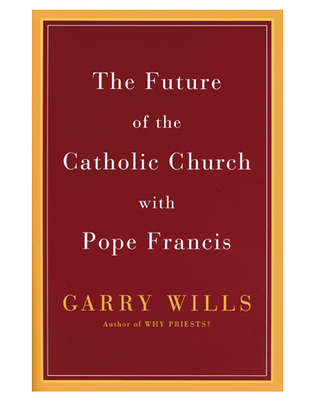
The Future of the Catholic Church with Pope Francis
Garry Wills ’61PhD
Viking Adult, $27.95
Reviewed by Mark Oppenheimer ’96, ’03PhD
Before he was the great popular expositor of Augustine, he was the best-selling historian of Lincoln at Gettysburg; before that, a popular commentator on presidents, from Reagan to Kennedy to Lincoln; before that, a young-buck Catholic intellectual, author of the classic Bare Ruined Choirs; before that, a recipient, in 1961, of a classics PhD from Yale; and, before that, Garry Wills was a Jesuit priest in training, who left the order before he got halfway through. And Wills, without question one of the United States’ leading public intellectuals, has never stopped being a devout Catholic (although nobody is ever sure what that means). He still prays the Rosary every day—he wrote a book about the practice—and you wouldn’t want to get in the ring with this guy and throw theological punches; he’d knock you out and then curse your prone body in the ancient language of your choice. But he is one of the great antagonists of the church hierarchy. He would no doubt hold with the loosely translated quotation, attributed to Diderot, that men will not be free until the last king is strangled with the entrails of the last priest.
The Future of the Catholic Church with Pope Francis is Wills’s latest book-length cry of anti-clericalism—but with a twist at the end. To get at the importance of Pope Francis, he begins with an extensive, mirthful catalogue of the church’s terrible sense of its own history. On issues from priests’ chastity to abortion, Wills shows that popes and theologians have backflipped like Romanian gymnasts every couple of centuries, twisting Scripture tendentiously to make whatever case they prefer, for whatever epoch they are in. These historical essays take up about nine-tenths of the book, and by the end one wonders, now that Wills has demonstrated the incoherence of Thomas Aquinas’s natural law and the feckless imbecility of today’s bishops, what is left of the Catholic tradition. But then his purpose becomes clear: if theological tradition is this malleable, it can be fixed as easily as it can be broken. What has been perverted can, with one strong, noble papacy, be set straight. Or at least the work can begin.
It’s not as if Wills doesn’t like theology. He’s a Catholic, not a Scripture-only Protestant—and even those Protestants managed, paradoxically, to fill volumes with their reflections on why one needs only the Bible, not theological reflection. But Wills seems to believe that theology has been captured by the hierarchy; instead of being a tool to help the laity understand their faith better, it has become a legal code, wielded by a capricious Vatican gendarmerie. If the popes look hard enough, they can find a rule for, or against, anything. Want to keep women out of the priesthood? Let’s see—there’s a rule for that. Abortion not a concern of the early church, but we want to ally with the political right on that issue? We can find a rule for that. It’s as if theologians have been writing those vague ordinances, like “disorderly conduct,” that can be used to charge anyone with anything.
So, more than anything, this book is a sly attempt to put theology in its proper place. Wills is more concerned with what Christians say and do—at their best, feed the poor and comfort the sad—than with what they write. For many years, Pope Francis worked among the poor in an Argentine slum. He has spoken of his own fallibility. And, Wills writes, Francis “easily uses inclusive language, as when he calls the hierarchy—not the church, but the hierarchy—‘Mother Church.’ He said, ‘I dream of a church that is a mother and shepherdess.’ If he says that, how can he exclude women from any offices in the church? This pope shows by doing.” Wills is optimistic about a pope who shares his disdain for the men in robes. He quotes Francis: asked what he thinks about the fact that many people believe in God but not in priests, the then-cardinal replied, “That’s just fine. Many priests are not worthy of their belief.”
 loading
loading
1 comment
-

Steven S. Hall, 2:44am March 29 2015 |  Flag as inappropriate
Flag as inappropriate
The comment period has expired.Pope Francis is Mother Theresa in a man's body. Luciani (John Paul I) wanted to do what the current Pope is doing and was poisoned for his trouble-making.